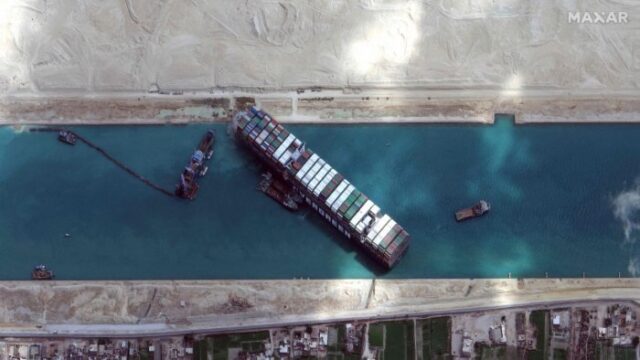
Gift Joseph Okpakorese
The world is all about constant growth and development and one of the major factors that thrive economies globally, is the level of hard work, consistency, creativity, and strong business acumen in recognition of good profit-oriented investments and taking advantages of opportunities that benefits and generate revenues for one’s country.
These sorts of international trade unions could also enhance diplomatic relationships within countries; improve individual businesses as well in terms of mutual support, transactions and partnerships, and trade unions.
One of the key factors in doing worthwhile business is the means of transportation of goods and services, which enables customers, get the direct satisfaction they crave and without which, business transactions would not be complete.
It’s been recently confirmed by news outlets that the Ever Given, a mega-container ship, which was reportedly deserted in Egypt’s Suez Canal, is blocking an estimated $9.6 billion (N3.93 trillion) of goods per day.
The sad news which is obviously bad for global trade unions is been touted to have an adverse effect on numerous economies as it is said to be crumbling individual and collective livelihoods as businesses groan under a scarcity of products and services.
According to the story, the 200,000-tonne ship could be equated with the length of four football pitches, and it’s also recognized as one of the planet’s greatest container boats, which has the capacity of conveying an estimated number of over 20,000 containers.
Reports revealed that on Tuesday last week the mega-container ship was stuck in Egypt’s Suez Canal, which happens to be the shortest shipping path from Europe to Asia.
Marine experts had confirmed the ship had run wrecked in the narrow canal which divides Africa from the Sinai Peninsula.
Commenting on the tragic incidence, Lloyd List, a shipping expert, rates Suez Canal’s westbound traffic at roughly $5.1 billion per day, and eastbound daily traffic at around $4.5 billion.
Moreover, in the opinion of Lloyd’s List search data, more than 160 vessels are pausing at either end of the canal. These include 41 bulk carriers and 24 crude tankers.
Hence, the 400-meters (1,300 feet) long vessel blockage has resulted in massive traffic and holdup of other ships intending to pass via the canal, as such causing major disrupting in shipping activities.
Due to the futile efforts recorded so far, in the attempt to remove the ship from its unwanted position, experts, going by their calculations have conceded that it could probably take longer than expected precisely some weeks to remove the ship.
Another negative impact that has resulted from this ugly incidence is the fact that thousands of compartments packed with customer items are delayed by the stranded ship, and also other empty containers are also meant to convey goods needed for exports.
Reports are claiming that some companies have already started making arrangements and alternative plans for transportation for merchandise. While some have approved flights others are seeking to use trains for transporting higher value products.
For instance, Maersk and Hapag-Lloyd — two major shipping companies, have confirmed that they are considering options that could help them avoid the Suez Canal completely in their means of transportation.
Meanwhile speaking on the current state of things, Egypt’s Suez Canal Authority (SCA) has revealed that it was doing all within its ability to refloat the ship with tug boats, dredgers, and heavy earth-moving equipment.
Furthermore, the halt of traffic through the narrow channels has worsened problems for shipping chains that were already facing upheaval and holdups in providing retail goods to buyers and consumers due to the COVID-19 plague.







